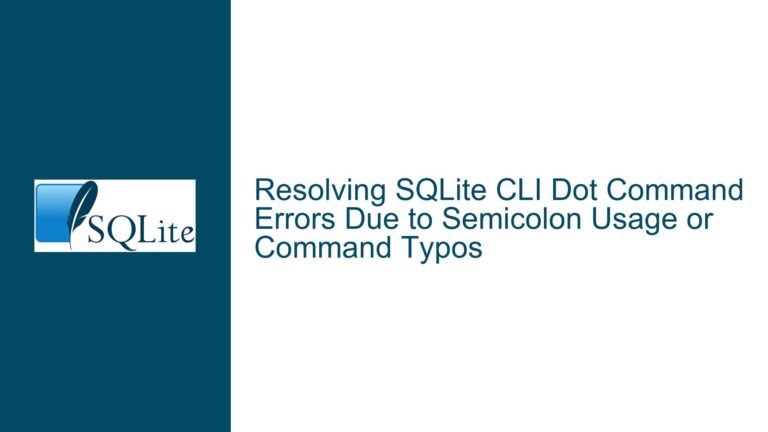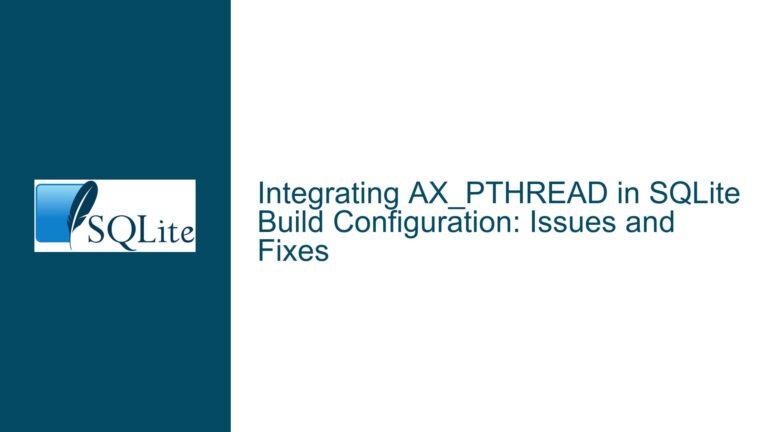SQLITE_OMIT_TRIGGER Compilation Warnings and Build Issues
SQLITE_OMIT_TRIGGER and Implicit Function Declarations in C99
When working with SQLite, particularly during the compilation process, developers may encounter a series of warnings related to implicit function declarations. These warnings are often triggered when using certain compile-time flags, such as SQLITE_OMIT_TRIGGER, SQLITE_OMIT_WINDOWFUNC, and SQLITE_OMIT_PRAGMA. The warnings typically manifest as implicit declarations of functions like sqlite3DeleteTriggerStep, sqlite3FinishTrigger, sqlite3BeginTrigger, and others. These warnings are not just superficial; they indicate a deeper issue with the build process, specifically when using the SQLite amalgamation.
The amalgamation is a single-file version of SQLite that combines all the source code into one large file, making it easier to include in projects. However, this convenience comes with certain limitations, particularly when it comes to compile-time flags that are designed to omit specific features. The warnings about implicit function declarations arise because the amalgamation does not fully support these flags. This can lead to confusion and potential runtime errors if the omitted functions are called during execution.
The core of the issue lies in the fact that the amalgamation is pre-processed and does not include the necessary conditional compilation directives that would allow these flags to work as intended. When you attempt to compile the amalgamation with flags like SQLITE_OMIT_TRIGGER, the compiler does not recognize the functions that are supposed to be omitted, leading to implicit declarations. These declarations are invalid in C99, which enforces stricter rules about function declarations and definitions.
Compile-Time Flags and Amalgamation Limitations
The root cause of the warnings is the incompatibility between certain compile-time flags and the SQLite amalgamation. The amalgamation is a pre-processed version of SQLite that combines all the source files into a single file, sqlite3.c. This file is designed to be easy to include in projects, but it does not support all the compile-time flags that are available when building from the full source tree.
When you build SQLite from the full source tree, the build system includes conditional compilation directives that allow you to omit specific features using flags like SQLITE_OMIT_TRIGGER. These directives ensure that the omitted functions are not included in the build, and the compiler does not generate warnings or errors related to them. However, when you use the amalgamation, these conditional compilation directives are not present, and the compiler encounters references to functions that are supposed to be omitted.
For example, if you compile the amalgamation with SQLITE_OMIT_TRIGGER, the compiler will still encounter references to functions like sqlite3DeleteTriggerStep and sqlite3FinishTrigger. Since these functions are not defined (because they are supposed to be omitted), the compiler generates warnings about implicit declarations. These warnings are not just cosmetic; they indicate that the build process is not working as intended, and the resulting binary may not behave correctly.
The issue is not limited to SQLITE_OMIT_TRIGGER. Other flags, such as SQLITE_OMIT_WINDOWFUNC and SQLITE_OMIT_PRAGMA, also do not work correctly with the amalgamation. This is because the amalgamation is a pre-processed version of the source code, and it does not include the necessary conditional compilation directives to support these flags.
Building from Full Source Tree and Conditional Compilation
To resolve the issue of implicit function declarations and ensure that compile-time flags like SQLITE_OMIT_TRIGGER work as intended, you need to build SQLite from the full source tree rather than using the amalgamation. The full source tree includes all the necessary conditional compilation directives that allow you to omit specific features using compile-time flags.
When you build from the full source tree, the build system processes the conditional compilation directives and ensures that the omitted functions are not included in the build. This eliminates the warnings about implicit declarations and ensures that the resulting binary behaves correctly. The full source tree also provides more flexibility in terms of customization, as you can enable or disable specific features based on your requirements.
To build SQLite from the full source tree, you need to download the source code from the official SQLite website and follow the build instructions provided in the documentation. The build process typically involves running a series of commands to configure the build, compile the source code, and generate the final binary. During this process, you can specify the compile-time flags that you want to use, such as SQLITE_OMIT_TRIGGER, SQLITE_OMIT_WINDOWFUNC, and SQLITE_OMIT_PRAGMA.
Once you have built SQLite from the full source tree, you can verify that the omitted features are not included in the binary by checking the size of the binary and testing its functionality. If the omitted features are not included, the binary should be smaller, and any attempts to use the omitted features should result in errors or undefined behavior.
In addition to building from the full source tree, you can also use other techniques to avoid the issues related to implicit function declarations. For example, you can use static analysis tools to detect and eliminate implicit declarations in your code. These tools can help you identify potential issues before they become problems, and they can also help you ensure that your code complies with the C99 standard.
Another approach is to use a custom build system that includes the necessary conditional compilation directives to support the compile-time flags that you want to use. This approach requires more effort, but it provides greater flexibility and control over the build process. You can create a custom build system using tools like CMake or Make, and you can include the necessary directives to ensure that the omitted features are not included in the build.
In conclusion, the issue of implicit function declarations when using compile-time flags like SQLITE_OMIT_TRIGGER with the SQLite amalgamation is a result of the amalgamation’s limitations. To resolve this issue, you need to build SQLite from the full source tree, which includes the necessary conditional compilation directives to support these flags. By doing so, you can eliminate the warnings about implicit declarations and ensure that the resulting binary behaves correctly. Additionally, you can use static analysis tools and custom build systems to further enhance the build process and ensure compliance with the C99 standard.






